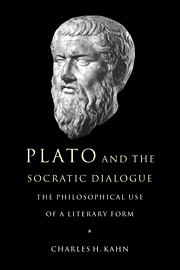Book contents
- Frontmatter
- Contents
- Preface
- List of abbreviations
- 1 Sōkratikoi logoi: the literary and intellectual background of Plato's work
- 2 The interpretation of Plato
- 3 Socrates
- 4 Plato as a minor Socratic: Ion and Hippias Minor
- 5 Gorgias: Plato's manifesto for philosophy
- 6 The priority of definition: from Laches to Meno
- 7 Charmides and the search for beneficial knowledge
- 8 Protagoras: virtue as knowledge
- 9 The object of love
- 10 The emergence of dialectic
- 11 The presentation of the Forms
- 12 Phaedrus and the limits of writing
- Appendix On Xenophon's use of Platonic texts
- Bibliography
- Indexes
3 - Socrates
Published online by Cambridge University Press: 02 November 2009
- Frontmatter
- Contents
- Preface
- List of abbreviations
- 1 Sōkratikoi logoi: the literary and intellectual background of Plato's work
- 2 The interpretation of Plato
- 3 Socrates
- 4 Plato as a minor Socratic: Ion and Hippias Minor
- 5 Gorgias: Plato's manifesto for philosophy
- 6 The priority of definition: from Laches to Meno
- 7 Charmides and the search for beneficial knowledge
- 8 Protagoras: virtue as knowledge
- 9 The object of love
- 10 The emergence of dialectic
- 11 The presentation of the Forms
- 12 Phaedrus and the limits of writing
- Appendix On Xenophon's use of Platonic texts
- Bibliography
- Indexes
Summary
Socrates is … not so much the mask behind which Plato is hiding as rather the enigmatic paradigm figure whose secret drives Plato on to ever new doctrinal and literary interpretations and who motivates his philosophical advances; his philosophizing is embedded in ever new attempts at a poetical modeling of his master. The obligatory participation of Socrates in all Platonic dialogues (except for the Laws) is, then, the visible testimony that Plato throughout his life remained a Socratic, who strove to fulfill the unfinished work of his master.
Harald PatzerTHE IMPORTANCE OF SOCRATES
In Plato's work the presence of Socrates is overwhelming. Out of twenty-five or more dialogues, Socrates is absent from only one: the Laws. (And this is so exceptional that Aristotle, in a slip, can refer to the Laws as one of the “discourses of Socrates,” Politics 11.6, 1265a11.) Even in Plato's latest period, where Socrates, though present, is normally replaced as chief speaker by a visitor from Elea or Locri, he can still surprise us. In the Philebus he resumes once more the role of protagonist when the topic under discussion returns to familiar Socratic territory, the relation between pleasure and the good.
It is not simply Socrates as dramatis persona who persists throughout Plato's work. It is Socrates as the martyred embodiment of a moral ideal and also Socrates as the paradigm philosopher, tirelessly pursuing intellectual inquiry by the method of question and answer. If for Plato the highest form of philosophical activity is named “dialectic,” the art of conversational discussion, that is an obvious reminder that the method of Socratic conversation remains Plato's model for philosophic teaching and research.
- Type
- Chapter
- Information
- Plato and the Socratic DialogueThe Philosophical Use of a Literary Form, pp. 71 - 100Publisher: Cambridge University PressPrint publication year: 1997



